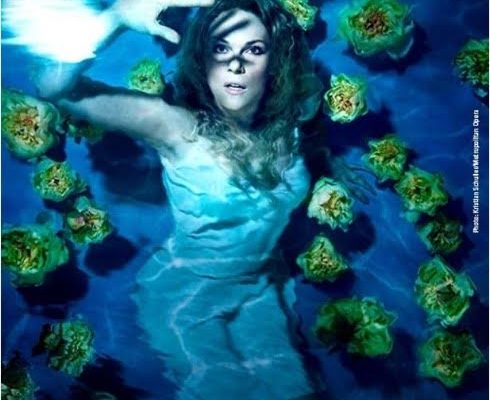“Rusalka.” The story of a water nymph who wants to become human due to her love for a prince who swims in her waters. She is a daughter of the Water Gnome, a child of the chill waters with pale blonde hair and clad in flowing garments of varying shades of blue and green, together creating the illusion that she not only has a tail, but that she is truly a part of the water. “Rusalka” is a Czech Opera composed in 1900 by Antonin Dvořák and based on the tale of “The Little Mermaid” by Hans Christian Anderson. While the tale itself is grim, it is not, as many think, inspired by the works of the Brothers Grimm.
In addition to Rusalka’s (Kristine Opolais) dress, the costumes for the entirety of the show were exquisite. There was immense detail put into each aspect of the characters’ clothing, from the intricate details on the buttons decorating the tunic of an unnamed character who appeared for only a moment, to the elaborate design on the Prince’s (Brandon Jovanovich) coat. Some of the most complex costumes were those of the wood sprites who open the play to taunt the Water Gnome (Eric Owens) as night falls, showing that the creatures of the water can come to the surface. Their costumes appear to be made of trees and leaves; transparent body suits worn against their skin are elaborately decorated, so they appear to be made of flexible wood. Their skirts are woven ballet tutus, covered in a thin mesh that resembles soft moss, and the entire affair makes it appear as if these dancers have stepped out from a tree and, at any moment, can return.
Despite the magnificent amount of detail put into the costumes, the set designers were in no way frugal when it came to the construction of the rest of the mise en scène. The detail put into the sets in particular was possibly even more immense than that which went into the costumes due to their extravagant size and visibility. Rusalka’s voice is taken away by the witch Jezababa (Jamie Barton) in exchange for a potion that enables her tail to separate into legs. When this occurs, the set changes. Previously, the stage is lit as if by moonlight, and at certain moments, a moon appears in the background, casting the stage in light blues that combine with the green of the forest and the smoke from the water to create a mystical poolside. When Rusalka descends into Jezababa’s lair, the lights dim and the set is reminiscent of a mad scientist’s lab, with potions on the wall, stark white electrical lighting, and a threatening white curtain with blood stains. Then, Rusalka is at the King’s palace, a place of passion expressed through red and orange lighting, costume, and set colors. These colors contrast completely with the set of the lake, and, with her dress a pale blue, Rusalka appear to stands starkly apart from all those who surround her, regardless of her true physical proximity to them. She is a fish out of water in the middle of a humanity ridden palace.
As a whole, the opera was nothing less than phenomenal, but the music in particular was truly capturing. From the opening notes, the musical score swept the audience into a tale of hope, love and despair, by-passing the heart and latching directly into the listener’s soul. In operas, the music is the center of and carries the story as they are entirely sung and accompanied by a live orchestra, but, when for an entire act the leading soprano cannot sing, the music becomes even more focal as it must become Rusalka’s voice. It must convey the water nymph’s every thought and emotion. In one momentous scene, the music lifts as if Rusalka is about to join the Prince in a duet. Her entire body transforms, and everything seems to come to a standstill for a single breath — when her expression and the music fall as she realizes that she cannot join her love in his song to express the depth of her love for him before he departs with a foreign princess.
In true classical fairy tale fashion, “Rusalka” does not have a happy ending. The Prince recognizes his mistake, but too late. Rusalka has her voice back, but she is trapped in a human form and cannot return to her family; as for the Prince, she cannot kiss him or he will die. He begs her, saying that her kiss will put him out of his misery, and that he does not care if he dies. Convinced that he will be driven to insanity without her kiss, and that by killing him she will be able to rejoin the other nymph, she obliges. He dies and she is heartbroken, beginning a lament, yet with some hope that she can now leave the limbo she is trapped in, neither human nor nymph, mortal or immortal, only to find that this sacrifice is not enough. She can never return to her family. Rusalka will live an immortal life, alone and guilt ridden, in a hell of her own creation, trapped by the curse placed on her by Jezababa and sealed by the Prince’s kiss.


Leave a Reply